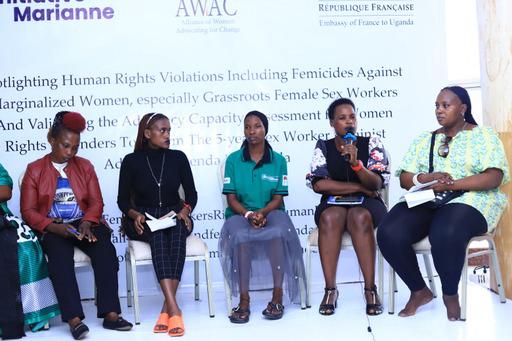
KAMPALA – Nakirya Miria is a female sex worker from Ssembabule district. She narrates that for the last four months, she and her colleagues have had a nightmare following the gruesome killing of their fellows.
She says it all started one morning on November 15, 2023, when they found one of their colleagues – Annet Nantingo dead in her room.
“Alarm was made, people and police came but everyone was condemning the dead, “It seems she got a man, stole from him, the reason why he killed her”. We said even if that was the case, she would have been reported to the police.”
A month later, on December 16, Nakirya says another fellow was also found dead in her room after hearing her one-year and eight-month-old baby crying helplessly.
“We wondered if this one also had stolen any man’s money,” she said during Alliance of Women Advocating for Change – AWAC’s community dialogue in the commemoration of the International Women’s Day on Friday.
The dialogue was focused on how the grassroots sex work community can proactively amplify its voices to address the ongoing violations and accelerate access to justice, health, and other services critical to marginalized women such as female sex workers, women with disabilities, women living with HIV, migrant refugee women and women who use and inject drugs.
Also on January 16, she revealed that her immediate neighbor – Najjuko Promise was murdered in the same way. She also had an eight-month-old baby.
According to AWAC, there are other more sex workers killed in a similar way between October 24th, 2023, and February 5th, 2024 not just in Sembabule, but also in Wakiso, and Kawempe Division -Kampala District including; Madrine Nakuya, Flavia Ajuka, Mulungi Annet, Mastula Nabasirye, Nimusima Edith, and Nakatudde Shamim.
However, Nakirya says they have done everything possible in their capacity but authorities have not helped.
“We cried out to the police but we were instead arrested and charged shs100,000 to be released.”
Ms. Naseremba Shafra, a deaf sex worker from Katakwi, Kampala also shares that they are violated against by people who hear but they hardly get justice even when they report.

“A customer comes, you bargain but because he sees that you can’t talk, he exploits you, and doesn’t pay. When you try to report, they wonder what made someone who doesn’t talk or hear to join this kind of job but they forget that we also need the money, we have bills to pay as well,” she said.
Kyomya Macklean, Executive Director, AWAC Uganda said that these cases represent a reprehensible manifestation of Gender-Based Violence (GBV) but also underscore the urgent need for resolute action to combat the systemic discrimination and violence faced by women.
“With AWAC’s vision to see that sex workers are free from any social economic violence, we urgently call for the full decriminalization of voluntary adult sex work in Uganda.”
She added, “Removing criminal prosecution of sex work goes hand-in-hand with recognizing sex work as work and protecting the rights of sex workers through workplace health and safety standards. Decriminalizing sex work means sex workers are more likely to live without stigma, social exclusion, and fear of violence. We urge authorities to prioritize the protection of marginalized women, including sex workers, who are disproportionately exposed to multiple and newer forms of targeted violence and therefore victims in this matter.”

She emphasized the need for authorities to address the root causes of these killings and recognize the importance of working towards fostering a community where all women are treated with respect, dignity, and equality.
Sheila Muwanga Nabachwa, a renowned human rights activist said that much as Uganda, like many countries in Africa criminalizes sex work, it doesn’t call for violence against them.
“The issue is about violence against women engaging in sex work. Regardless of anyone’s status, violence is unacceptable, it is a crime in the laws of Uganda.”
Also, Muwanga says there is still a challenge of access to health services by this minority group.
“Sex workers definitely are treated differently in health centers because they are also seen by health workers as immoral. Yes, there has been improvement due to sensitization but there are still challenges.”
Commenting on the accusations, ASP Asiimwe Muteera, Community Laison Officer, Kawempe police division said that they are challenged because Uganda hasn’t legalized sex work, and “in the meantime, we treat it as prostitution.”
“In our context, it is punishable by law.”
“However, we have to admit that these sex workers serve people including married men and even high-profile people. We recognize that they exist but illegally. As law enforcement officers, we are caught between the lines but our core mandate is to implement what the law says. Yes, they may call it being victimized, mistreatment but what we do basically is enforcement.”

he added, “What I can appeal to them and other stakeholders is to push for the legalization of their work.”
However, he denied police officers taking part in abusing the rights of the sex workers.
On the killings, he noted that they are yet to establish if this is targeted at the sex workers and they are carrying out investigations.
“Whether you have killed a sex worker or whoever, that’s punishable by law, so when we are investigating, we investigate a murder case of a Ugandan.”
Meteera advised them that “whereas you are operating illegally also put some security measures. Not everyone who comes to you wants sex, others have intentions.”





